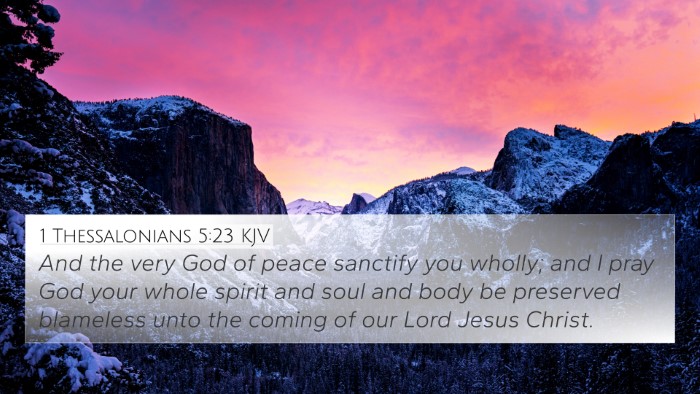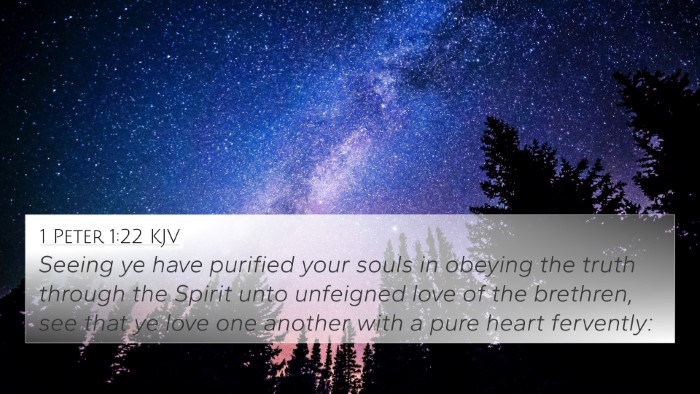Meaning and Interpretation of 2 Corinthians 7:1
Verse: "Having therefore these promises, dearly beloved, let us cleanse ourselves from all filthiness of the flesh and spirit, perfecting holiness in the fear of God." (2 Corinthians 7:1)
Overview
This verse encapsulates the exhortation from the Apostle Paul to the Corinthians as he emphasizes the need for moral and spiritual purity. As per the view of the commentators, this call to action underlines a necessary response to the promises of God which have been bestowed upon believers.
Combined Insights from Public Domain Commentaries
Matthew Henry's Commentary
Matthew Henry suggests that the "promises" referenced are critical for understanding the call to holiness. He interprets this verse within the context of God’s covenant, stating that believers are encouraged to respond to these promises by living righteously. Henry highlights the dual aspect of cleansing, which involves both the body ("filthiness of the flesh") and the inner self ("spirit"). This purification process results in the perfection of holiness, indicating a deep respect for God.
Albert Barnes' Commentary
Albert Barnes emphasizes the significance of the phrase "dearly beloved," which implies a special relationship God has with His people. He clarifies that purification is not merely a ceremonial act but requires genuine commitment to abandoning sin. Barnes draws attention to the "fear of God" as a foundation for holiness, reminding believers that their actions are not just about achieving moral purity but honoring God in every aspect of their lives.
Adam Clarke's Commentary
Adam Clarke expands on the need to "cleanse ourselves" by discussing the personal responsibility of each believer. Clarke sees this as an active pursuit of holiness whereby believers should engage in introspection and repentance. He aligns the concept of “perfecting holiness” with the idea of spiritual maturity, suggesting that the fear of God is essential to this journey. Clarke also brings in the aspect of communal holiness, noting the impact it has on the community of faith.
Key Cross-References
- Hebrews 12:14: "Follow peace with all men, and holiness, without which no man shall see the Lord." - highlights the necessity of pursuing holiness.
- 1 Thessalonians 4:3: "For this is the will of God, even your sanctification, that you should abstain from fornication." - emphasizes God's desire for believers to be sanctified.
- James 4:8: "Draw nigh to God, and he will draw nigh to you. Cleanse your hands, ye sinners; and purify your hearts, ye double-minded." - a call for active cleansing and drawing closer to God.
- Philippians 2:12: "Work out your own salvation with fear and trembling." - an encouragement for believers to take responsibility in their salvation journey.
- Romans 12:1: "I beseech you therefore, brethren, by the mercies of God, that ye present your bodies a living sacrifice, holy, acceptable unto God, which is your reasonable service." - stresses the importance of presenting oneself in holiness.
- 1 Peter 1:15-16: "But as he which hath called you is holy, so be ye holy in all manner of conversation; Because it is written, Be ye holy; for I am holy." - underscores the call to imitate God's holiness.
- Ephesians 4:22-24: "That ye put off concerning the former conversation the old man, which is corrupt according to the deceitful lusts; And be renewed in the spirit of your mind; And that ye put on the new man, which after God is created in righteousness and true holiness." - depicts a transition into a life of holiness.
Thematic Connections and Analysis
The core theme of 2 Corinthians 7:1 aligns with broader Biblical teachings regarding holiness and sanctification. The interconnectedness of these scriptures provides a delicate web of theological principles emphasizing the transformational aspect of holiness, deeply linked to the believer's relationship with God. The fear of God serves as a motivator for both personal and communal purity, illustrating how believers are called to navigate their moral obligations.
Application for Today's Believers
For modern Christians, 2 Corinthians 7:1 serves as a poignant reminder of the necessity for self-examination and commitment to a lifestyle reflective of God’s holiness. The process of cleansing oneself can be seen as both a spiritual and ethical endeavor, requiring consistent engagement with scripture, prayer, and community accountability. Each believer's dedication to living a life of holiness not only honors God but also serves as a witness to the world of the transformative power of faith.
Conclusion
In conclusion, 2 Corinthians 7:1 encapsulates a powerful message about the covenantal relationship between God and His people, driving home the importance of living in purity and reverence to God. By engaging in comparative Bible verse analysis and cross-referencing related scriptures, believers can deepen their understanding of God's call to holiness and the practical steps necessary to fulfill that calling.


























